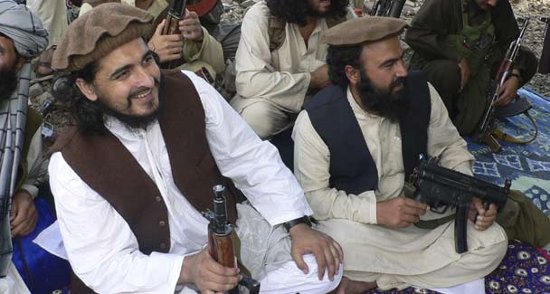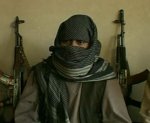Iraq Report: Pressuring Iran and success in Anbar
 The United States is maintaining the pressure on Iran for its support of both Shia militias and Sunni insurgents. Yet again, Multinational Forces Iraq has detailed the Iranian involvement in supplying weapons and support for the Shia militias. In today's press brief, Major General William Caldwell also stated some aid from Iranian intelligence services was being given to Sunni insurgents. The United States has also rejected the Iranian demand that five Iranian Qods Force officers captured in Irbil last January be released. Iran has been pressing for their release, particularly since the release last week of 15 British sailors and marines captured by Iran in the Persian Gulf.
The United States is maintaining the pressure on Iran for its support of both Shia militias and Sunni insurgents. Yet again, Multinational Forces Iraq has detailed the Iranian involvement in supplying weapons and support for the Shia militias. In today's press brief, Major General William Caldwell also stated some aid from Iranian intelligence services was being given to Sunni insurgents. The United States has also rejected the Iranian demand that five Iranian Qods Force officers captured in Irbil last January be released. Iran has been pressing for their release, particularly since the release last week of 15 British sailors and marines captured by Iran in the Persian Gulf.
Meanwhile, the political block run by Iranian proxy Muqtada al Sadr has threatened to withdraw from the Iraqi government:
The statement from the Sadrists accused [Prime Minister] Maliki of "ignoring the will of the people," and said, "We reject these statements which coincide with the failure of security performance through not implementing the security plan in all parts of Baghdad...We discussed withdrawing from the Iraqi government, which will not be able to fulfill citizens™ demands in the security and services fields,"� adding that they are "serious" in their consideration of withdrawing support.
This comes as U.S. and Iraqi security forces are conducting a campaign to dismantle Sadr's Mahdi Army in Diwaniyah. Sadr's political block has threatened to withdraw from the government in the past, only to back down from its threat.
Yesterday's clash in the central Baghdad neighborhoods of Fadhil and Sheik Omar in the Rusafa district resulted in 20 insurgents killed and another 30 wounded, according to a U.S. military spokesman. Four Iraqi soldiers were killed and 15 U.S. troops were wounded during the intense battle that raged throughout the day and involved Apache gunships, F-16s, and F-18s called in for close air support. Twelve of the U.S. soldiers wounded during the action returned to duty.
U.S. and Iraqi forces completed a five day operation in the town of Arab Jabour. The operation resulted in one terrorist killed and another 13 captured, along with the discovery of multiple weapons caches. "Included in the weapons caches found, Coalition Forces discovered numerous rocket-propelled grenades and launchers, several improvised explosive devices, thousands of anti-aircraft ammunition rounds and three buildings containing large amounts of IED-making materials," notes the Multinational Forces Iraq press release. On Wednesday morning, a follow-on raid netted "the suspected al-Qaeda in Iraq security emir of Arab Jabour" along with four of his associates.
In Anbar province, some signs of success can be seen in the cities that served as insurgent havens in the past. Al Jazeera reports the city of Hit (or Hiyt) has seen a marked decrease in violence ver the past month. "The guns in the city... have finally fallen silent, thanks to the efforts of local administrators and security forces." The turn around in Hit is credited to the return of the Iraqi police in mid March, and the efforts of Sheikh Abdul Sattar Abu Risha, the leader of the Anbar Salvation Council. Security has been tightened in the city and local elections were held on April 4.
Hit is now forming its own Emergency Response Unit (ERU), a tribal levy that will ultimately be integrated into an Anbar provincial police/counterterrorism force. The local tribal leaders have recruited 500 volunteers. Eight ERUs are being formed in Anbar province. Three are currently active in Ramadi, where violence has been cut in half over the past month.
The city of Khalidiya in the Habbaniyah region of Anbar province has also seen a turnaround. Captain Eric Coulson, a company commander of an Army engineer unit that provides route clearance in the Fallujah-Ramadi corridor, reports on the presence of the Anbar Salvation Council fighters in the city.
The Marines have this place locked down tighter than a drum. To do that they have engaged the local militia. The Sheik's men have turned out in droves. Ah - the challenge of counterinsurgency. Some of these men look none-too friendly, others give us an easy wave; they are not in uniform and they all carry AK-47s or the machine gun variant there of. They have set up road blocks, in modern military parlance, TCPs, traffic control points, and they are supposed to be on our side.
This is counterinsurgency today and this is a group that we must deal with if we want to move forward; not just Team Badger, but the Coalition. The hope is that first the militia will work with the Iraqi Security Forces, then some will join, the regular paycheck helps with that and I have been told by at least semi-knowledgeable sources those paychecks have been coming for the last six months or so, and then maybe there will be some realigning of loyalties and priorities.
I embedded with Major Owen West's Military Transition Team in Khalidiya for a week last January. During one operation, the tribal militias supported an Iraqi Army led operation to detain insurgents in the neighboring town of Sadiqiya. The Iraqi Army cordoned off an al Qaeda friendly mosque while the tribal fighters identified 25 members of the local insurgency. Three senior leaders were detained in the raid. Major West was upbeat about the prospects of securing the Khalidiya region, as the Iraqi Army, working with the local police and the Anbar Salvation Council, were working together to dismantle the insurgency.


